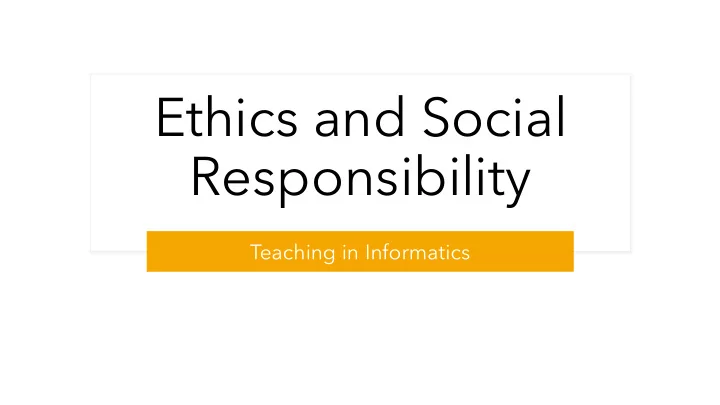

Ethics and Social Responsibility Teaching in Informatics
Goals • Update on curriculum changes • Reflect on current delivery • Discuss how to deliver this material
Why? • Informatics is a heavily applied discipline. • Wields a great and growing influence. • Cannot and should not be separated from the context in which it is applied. • Aim to produce graduates matured in their ability to recognise and tackle these issues.
Accreditation • BCS: "Programmes seeking accreditation must cover and assess the legal, social, ethical, and professional issues (LSEPIs) relating to computing." • Open challenge: "Students should not perceive LSEPIs as peripheral to, or less significant than, technical skills detailed in the syllabus."
Course name Level Material Professional Issues 10 Privacy and Security aspects are covered in few lectures. System Design Project 9 Students encouraged to look at ethical / social impacts of their projects. Varies by group. Advanced Vision 11 introductory mini-lecture (5 min) There is a lecture dedicated to Ethics. The content is mostly based on Menlo report, and getting Usable Security and Privacy 11 consent from participants. There is a lecture dedicated to Ethics. The content is mostly based on Menlo report, and getting Human-Computer Interaction 11 consent from participants. 1. Ethics and bias in NLP Natural Language Understanding, 2. Ethics continued, measuring bias Generation, and Machine Translation 11 3. Representations are biased (NLU+) + Maria's Guest lecture covering the School's Ethics process Machine Learning and Pattern MLPR mentions privacy issues with a case study. In few lectures, it mentions the care that would 11 Recognition be required when applying any algorithms to settings that might impact people's lives Decision Making in Robots and 11 Few lectures in safety, explainability, privacy. A lecture about ethics will be introduced next year. Autonomous Agents (DMR) Case Studies in Design Informatics 1 There is a lecture called 'Ethics in Design Research'. There is a tutorial about 'Thematic Analysis' 11 (CDI1) and another tutorial about 'How to apply for Ethical Approval'. 1. Data, evaluation, implications (2): use and collection of human data, including social media and assignment 2 Accelerated Natural Language 2. Data, evaluation, implications (3): evaluation, claims, and evidence 11 Processing (ANLP) 3. Guest lecture on ethical issues in NLP 4. Gender bias (esp in coreference) Doing Research in Natural Language 11 A week is spent on Shannon Vallor's "An Introduction to Data Ethics" book Processing Courtesy of Nadin Kokciyan Artificial Intelligence, Present and Future 11 Two lectures about Social and Ethical Issues
Curriculum Changes (Second Year) Foundations of Data Science SE and Professional Practice • Sample bias, licensing, privacy • Professional Responsibility (with issues reference to ACM Code of Conduct) • Visualization: misleading plots, colour and accessibility • Classification: algorithmic bias, Updates to Professional Issues the discrimination following year • Development vs deployment; does using the system change the data distribution?
Curriculum Questions • What else should we be teaching? • Where else should we be teaching it? • What should be required/optional? • How do we monitor and maintain a distributed approach?
Delivery • How best to deliver this material? • Guest lectures are a double-edged sword • Challenges/opportunities for delivery online • How do we assess? • Challenge of large courses • How do we motivate? • Let them know it will be a part of their assessment (SDP, Honours proj?)
More Delivery • Maintaining consistency across programmes • Introduction is important framing • Resource requirements (tutors/demonstrators) • Relation to "soft skills" development • Staff as role models • Ethical course delivery
Resources • BCS Accreditation Guidelines • BCS Code of Conduct • ACM Code of Ethics and Professional Conduct • Curriculum Plan
Recommend
More recommend